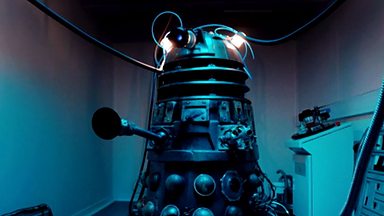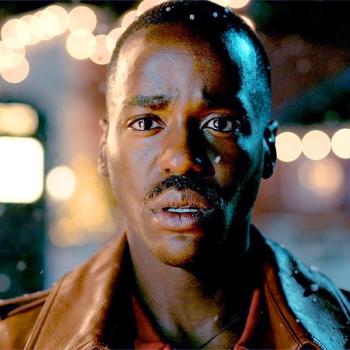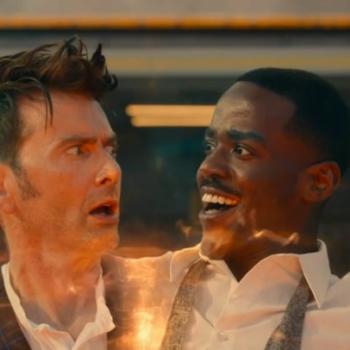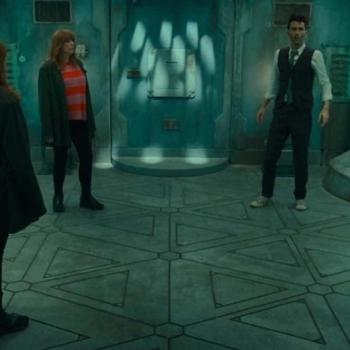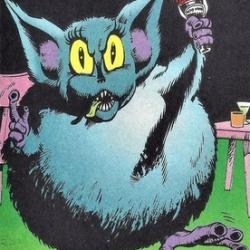I found the Doctor Who episode “Into The Dalek” felt rushed – they could have easily made this a two-parter and taken the time necessary to introduce characters and explore details. But the concept and the themes explored are fascinating, and give viewers much food for thought. Spoilers ahead!
The episode introduces the question of whether there can be a good Dalek. Clara’s comment when the Doctor says there’s no such thing gives an insight into how things will unfold. She says that the Doctor sounds unusually inflexible, indeed prejudiced. The Doctor has experienced damage, and the Doctor makes a quip about “morality as malfunction.”
The plan is for the Doctor to “get inside its head” – and not metaphorically. And so we get to see the classic science fiction scenario of people miniaturized and entering into another – a scenario which I think that Doctor Who never included in all its 50 years, so it was long overdue for this trope to be used!
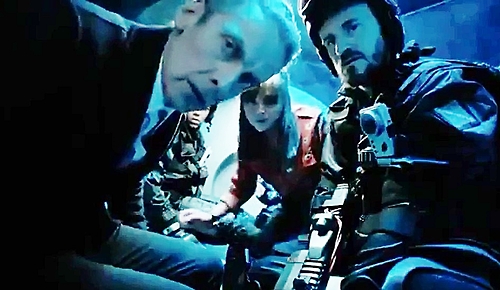 The Doctor asks the Dalek what changed it. The Dalek says it saw beauty. It uses the phrase made famous by the Cybermen and then later the Borg on Star Trek: “resistance is futile.” But in this case, the Dalek had seen a star born, even though Daleks have destroyed millions of stars, and had realized that “life returns; life prevails.”
The Doctor asks the Dalek what changed it. The Dalek says it saw beauty. It uses the phrase made famous by the Cybermen and then later the Borg on Star Trek: “resistance is futile.” But in this case, the Dalek had seen a star born, even though Daleks have destroyed millions of stars, and had realized that “life returns; life prevails.”
As an aside, a saying very similar to this – “life is victorious” – is repeated throughout Mandaean literature, most commonly as an ending of chapters in the Book of John and other works.
The Doctor heals the Dalek’s radiation leak, and it quickly returns to its instinct to exterminate. The Doctor says that this proves that there is no such thing as a good Dalek – “no miracle,” just radiation affecting its brain chemistry. Meanwhile, as the Dalek goes on its killing rampage, one of the soldiers says “God save us all.”
But Clara sees something the Doctor doesn’t. What they have learned is that a good Dalek is possible. The Doctor then sets about trying to reawaken the memories that had helped the Dalek learn good in the first place. The Doctor says hopefully that if he can turn one Dalek, he can turn them all, and save the future. The Doctor tells the Dalek (whom he has nicknamed “Rusty”) that he is going to save its soul – to which the Dalek responds that it doesn’t have one. The Doctor performs a sort of “mind meld” and lets the Dalek see inside his own soul, to see the universe as he sees it. And there, the Dalek sees the beauty of the universe – “endless divine perfection” and “divinity” – but also the Doctor’s hatred of the Daleks.
“Rusty” turns on its Dalek comrades and saves the humans on the spaceship (“Aristotle”). The Doctor is unhappy – earlier he had asked Clara whether he was a good man, and she said she didn’t know, to which he replied that neither did he. But a Dalek had looked into his soul and had seen hatred, and for the Doctor, “That’s not victory.”
But Clara has insight to offer once again, at the end of the episode. She said that she didn’t know if he was a good man, but he tries, and maybe that is the point. The Doctor makes an observation about her skills as a teacher.
The Doctor seems a bit callous at times, as well as being punny and sarcastic. But while some may perceive this as a significant change of direction, I would suggest that that perception is wrong, and perhaps due to the new attack eyebrows. If you go back and imagine Matt Smith saying the same lines, I trust that you will see that it is not only possible, but fairly easy to do.
The episode is really about the possibility of redemption – not just for the Dalek, but for the Doctor, and for soldiers present and future. There is an interesting suggestion that, for all the genetic manipulation that makes Daleks evil, there is a need for something more evil still – a computerized supplement to the Dalek’s brain that takes that evil tendency and supplements and enhances it. And so there is some suggestion that even a Dalek may not be beyond redemption. And if so, that has a hopeful message for human beings, and a challenging one for those who view other humans who are their enemies as being pure evil, with no hope of redemption or possibility of change.
When we see darkness rather than beauty, when we see other people as soulless and beyond redemption, we are not fighting the Daleks, we have become them.
What did you make of the episode “Into the Dalek”?
